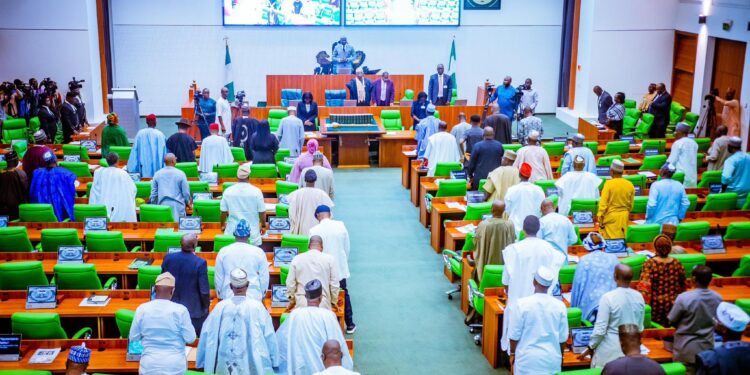A Senior Advocate of Nigeria (SAN), Mohamed Ndarani, has urged the House of Representatives Constitution Review Committee to include Edu State in the proposed list of 31 new states.
He argued that the creation of Eduko, otherwise, called Edu State from the present Niger State would give a sense of belonging to the Nupe people in Nigeria.
Ndarani made this statement during a press briefing in Abuja on Monday, joining the public discourse on the proposal by the committee.
Nairametrics previously reported that the Deputy Speaker of the House of Representatives, Benjamin Kalu, read the letter from the committee containing the proposal during plenary on Thursday in Abuja.
The proposal seeks to address demands for greater representation, economic viability, and regional balance in governance.
Breakdown of Proposed States
The letter read in part:
“The committee proposes the creation of 31 new states. As amended, this section outlines specific requirements that must be fulfilled to initiate the process of state creation.”
The proposed states include:
- North Central: Okun, Okura, and Confluence (Kogi); Benue Ala and Apa (Benue); FCT State.
- North East: Amana (Adamawa); Katagum (Bauchi); Savannah (Borno); and Muri (Taraba).
- North West: New Kaduna and Gurara (Kaduna); Tiga and Ari (Kano); Kainji (Kebbi).
- South East: Etiti and Orashi (as the 6th state in the South East); Adada (Enugu); Orlu (Imo); and Aba (Abia).
- South-South: Ogoja (Cross River); Warri (Delta); Ori and Obolo (Rivers).
- South West: Torumbe (Ondo); Ibadan (Oyo); Lagoon (Lagos); Ijebu (Ogun); Oke-Ogun/Ijesha (Oyo/Ogun/Osun).
The proposal is expected to undergo a constitutional process before implementation.
According to the letter read by Kalu, the specific requirements for state creation include:
- A request supported by at least two-thirds of the legislative representatives from the area seeking statehood.
- A referendum conducted in the affected area, with at least a two-thirds majority in favor.
- Approval by a two-thirds majority of the National Assembly.
- Endorsement by at least 24 state Houses of Assembly.
Ndarani Reacts
Reacting to the development, Ndarani stated that Niger State’s geographical mass is unquestionably larger than that of the entire South East and comparable to that of the South West.
He emphasized its vast land area and abundance of solid minerals.
“The proposed Edu State is a prospective oil-producing state and would be a viable and developed state with Bida as its capital,” he said.
- Ndarani added that Edu State would comprise various groups from the present Niger, Kogi, and Kwara states.
- He urged National Assembly members of Nupe origin from Kwara, Niger, and Kogi states, as well as the FCT, to support the creation of Eduko State.
“The original request for Edu State was presented to the National Assembly in September 2022 by a delegation of Nupe elders, leaders, and representatives from Bida, Agaie, and Lapai emirates.
“The request clearly aligns with the provisions of Section 8, Subsections 1, 2, and 3 of the 1999 Constitution (as amended), making it one of the most viable proposals,” he explained.
He argued that state creation has historically brought development closer to the people.
More Insights
The senior lawyer’s advocacy comes just days after Mike Ozekhome, SAN, described the proposal for additional states as a “wasteful venture.”
He maintained that the proposal is unnecessary amid more pressing national issues.
Ozekhome suggested that Nigeria needs only two key measures to address the structural imbalances in its federal system and drive development:
- The creation of one additional state in the South East to ensure parity with other regions.
- A new Constitution that is legitimate, people-driven, credible, and referendum-compliant to correct deep-seated structural imbalances in the federation.
Nairametrics reports that the creation of new states in Nigeria has long been a contentious issue.
Proponents argue that it will enhance governance, accelerate development, and bring government closer to the people. However, critics warn that additional states could increase administrative costs and strain federal resources.
- If approved, this restructuring would be one of the most significant political shifts since Nigeria’s last major state creation exercise in 1996, which increased the number of states from 30 to 36.
- The proposal is expected to generate heated debates in both legislative and public discourse as it progresses through the constitutional amendment process.
- Meanwhile, in a statement on February 6, 2025, Akin Rotimi Jr., Spokesman of the House of Representatives, clarified that these proposals for additional states were submitted as private member bills and do not represent the official position of the House.
He stated that the committee will align with constitutional provisions and will only consider proposals that comply with stipulated guidelines.


















